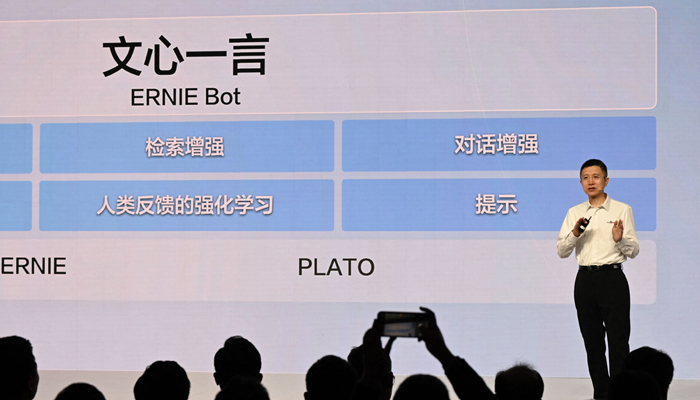Baidu's AI Chatbot 'Ernie Bot' leaves investors unimpressed
Chinese tech giants join global rush to develop rival software, with Alibaba, JD.com also announcing similar projects
March 16, 2023

BEIJING: Chinese search engine company Baidu's shares fell as much as 10% on Thursday after the company unveiled its ChatGPT-like AI software, with investors unimpressed by the bot's display of linguistic and maths skills.
The artificial intelligence (AI)-powered ChatGPT, created by San Francisco company OpenAI, has caused a sensation for its ability to write essays, poems or programming code on demand within seconds, sparking widespread fears of cheating or of professions becoming obsolete.
Chinese tech giants have joined the global rush to develop rival software, with Alibaba and JD.com also announcing similar projects.
But Baidu's "Ernie Bot", unveiled at a press event in Beijing on Thursday, fell short of expectations with the company's co-founder Robin Li showing only a pre-recorded demonstration of the software's capabilities, rather than a live interaction.
The company showed audiences a screen recording of the bot answering questions about the popular Chinese science fiction novel "The Three-Body Problem" and generating a plot summary.
It also showed off Ernie Bot's algebra skills and generated audio in the Sichuanese and Hakka dialects of Chinese.
Baidu's Hong Kong-listed shares plunged immediately after the software was unveiled, sliding by more than 10% at one point.
The company's shares recovered slightly afterwards, down around 7% on Thursday afternoon.
Baidu says it intends to integrate the bot into its search engine as well as its smart home devices, with "real-world applications across industries".
But China's strict censorship and US restrictions on chip sales could limit Baidu and other Chinese companies' AI ambitions.
ChatGPT is blocked in China, but the American software is gaining a base of Chinese users who use virtual private networks to get around the ban, deploying it to write essays and cram for exams.









